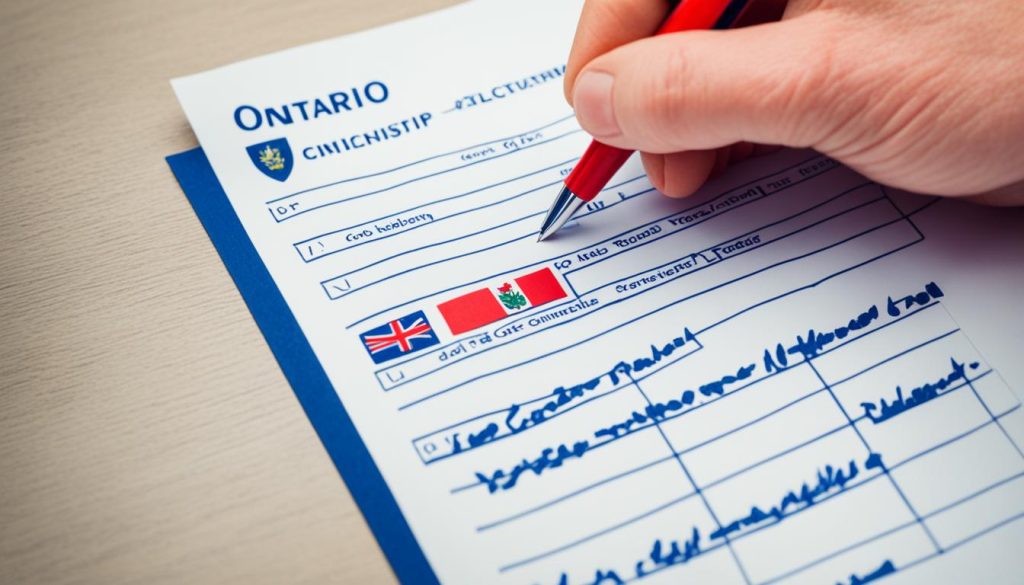Have you ever considered becoming a notary in Ontario? Whether you’re looking to expand your career opportunities or simply wanting to explore a new path, becoming a notary can be a rewarding and fulfilling venture. In this complete guide, we will walk you through the step-by-step process of how to become a notary in Ontario, answer common questions such as “Is online notary legal in Ontario?” and provide insights into the Ontario notary exam. So, if you’re ready to dive into the world of notaries and all that it entails, read on to discover everything you need to know on this exciting journey.
Introduction to Notaries in Ontario
In Ontario, notaries public hold a significant position in the legal scene. They operate under the Notaries Act. This act details their roles and the power they have within the province.
What is a Notary Public?
A notary public watches as people make oaths, sign legal papers, and confirms copies are real. They make sure that legal and official documents are genuine and valid.
Roles and Responsibilities of a Notary Public
- Witnessing the signing of documents
- Certifying the authenticity of document copies
- Administering oaths and affirmations
In Ontario, the key areas notaries public handle are:
· Watching the signing of important papers.
· Making sure copied papers are real and true to the originals.
· Having people swear to tell the truth.
Notaries here can also do what commissioners for taking affidavits do. They can confirm documents are signed right and that copies are exact. They play a crucial part in keeping legal and official processes in the province running smoothly and fairly.

Eligibility Requirements for Notary Public Appointment
In Ontario, both lawyers and paralegals can become notaries public. They need to be licensed by the Law Society of Ontario (LSO). This notary public role is for life if they keep their LSO status.
Lawyers and Paralegals Eligibility
To become a notary public, lawyers and paralegals in Ontario must have their LSO license. They can apply online through the Notary Public Portal. Or, they can apply by mail or in-person.
The process is easy. They just need to ensure they are actively practicing law. And they should be a member in good standing with the LSO.
Non-Lawyer and Non-Paralegal Eligibility
Non-lawyers and non-paralegals can also seek notary public roles in Ontario. They must show that notarizing documents is a big part of their job. Also, they need to prove they can legally work in Canada. The process for them is a bit more complex. They have to submit extra papers, like a work authorization letter.

How to Become a Notary in Ontario as a Lawyer or Paralegal?
In Ontario, becoming a notary public is quite easy for lawyers and paralegals. They can get this title through two main routes. One way is via the Notary Public Portal. The other is by mailing or applying in person.
1. Submit a Request via the Notary Public Portal
The Notary Public Portal is a service by Ontario’s Ministry of the Attorney General. It lets professionals like lawyers and paralegals apply smoothly. To start, they need to fill a service request form online and pay $145. However, this fee is not needed if you work for the government.
2. Submit a Request via Mail or In-Person
Another option is to apply for a notary public role by paper or in-person visit. Fill out the service request form and include the $145. Government employees won’t need to pay this fee either.
3. Notary Public Appointment Cost and Payment Methods
The cost to become a notary public in Ontario is $145, a one-time payment. You can pay this fee with a cheque, money order, or in person. Government employees are rarely charged this fee. After getting approved, you will get your notary public package. This pack includes a Certificate of Appointment along with a form for your embossed seal and signature.

After Appointment: Receiving Your Notary Public Package
After getting approved to be a notary public in Ontario, a package will arrive by mail. It comes with key items to start your notary duties. You’ll see your Certificate of Appointment in there. Also, a form for showing your unique notary public stamp and signature.
Certificate of Appointment and Specimen Signature/Seal
The ontario notary public certificate is a big deal. It shows you have the job of doing certain notarial tasks. With this certificate, you’ll also get a form. It’s for sending in samples of your notary public seal ontario and signature. They use this at the Official Documents Services (ODS). It’s how they know documents you’ve notarized are real.
Updating Your Signature and Seal
If you change your signature or seal, you need to inform the ODS. This step keeps your notary public stamp ontario accepted and valid. Then, whenever you notarize documents, they get verified right.

How to Become a Notary in Ontario for Non-Lawyers and Non-Paralegals?
Non-lawyers and non-paralegals in Ontario can also become notaries public. They have a different path to this goal, which involves unique requirements and steps.
1. Application Process for Non-Lawyers and Non-Paralegals
To become a notary public in Ontario, non-lawyers and non-paralegals must apply to the Ministry of the Attorney General. They should show that notarizing documents is essential to their job. The process includes filling out a form, getting a letter from their employer, and a security check consent form.
2. Letter of Authorization and Employment Requirements
The letter from the employer must explain why the applicant needs to do notarization as part of their job. This letter is crucial for showing that the applicant meets the notary public ontario requirements non lawyer, indicating they can notarize documents.
3. Application Fees for Non-Lawyers and Non-Paralegals
For non-lawyers and non-paralegals in Ontario, the fee to become a notary public is $110. But, this fee is waived for government employees. The fee is due when the ontario notary public application non lawyer is submitted to the Ministry of the Attorney General.
Applying to Become a Commissioner for Taking Affidavits
In Ontario, people can also apply to be a commissioner for taking affidavits. They can take affidavits and administer oaths. This role is important and holds certain legal powers.
Eligibility Requirements for Commissioners
If you’re a lawyer, paralegal, or a municipal clerk in Ontario, you’re already a commissioner. You don’t need to apply. Others must show they can legally work in Canada and prove they need this role for their job.
Application Process for Commissioners
To become a commissioner, you need to fill out an application. This includes a letter from your employer and a security check consent form. The Ministry of the Attorney General checks if you really need this job for your work.
Renewing or Changing Your Notary Public/Commissioner Appointment
Keeping your notary public or commissioner for affidavits job in Ontario up is easy. These positions last for three years. You can renew them for up to another three years. Renew before it runs out, but not more than two years early.
Renewal Process and Fees
If you renew early, it costs $50. If you wait until it’s almost done, the fee is $75. Some people don’t pay these fees, like government workers. To renew, apply through the right way, so you can keep working as a notary or commissioner.
Changing Your Stamp Wording or Replacing a Lost Certificate
Sometimes, you might need to update your stamp’s words or get a new certificate after losing one. This costs $17. Make sure your stamp and certificate are current. This helps show your documents are real and trustworthy.
Remote Notarization and Virtual Services
In Ontario, the way notarization works has changed a lot. This change is mainly due to the new option of remote and virtual notarization services. Since 2020, the law allows remote or virtual notarization here, but there are important rules to follow.
Legislative Updates on Remote Notarization
The Notaries Act was recently updated to possibly include remote notarization ontario in the future. But, as of now, there are no clear rules. This means virtual notarization ontario and online notary public ontario services are not allowed.
Conditions for Remote Notarization (if permitted)
For notarization to be done remotely, there must be new laws that say it’s okay. These laws would also set out what needs to happen for notarization to be valid. Without these specific rules, you still have to get documents notarized in person in Ontario.
It’s crucial for people and companies in Ontario to keep up with how notarization laws are changing. This includes laws about remote notarization ontario, virtual notarization ontario, and online notary public ontario. As the rules get clearer, the chance to use these digital services might open up. This change aims to make sure notarized documents are always real and trustworthy.
Suspension and Revocation of Notary Public Appointment
The Notaries Act in Ontario lays out reasons for pausing or ending a notary public’s role. If a lawyer or paralegal loses their license from the Law Society of Ontario or if their license is on hold, their notary public abilities are automatically stopped. This rule is vital. It makes sure only those currently in good standing can act as a notary public.
Grounds for Suspension or Revocation
A notary public may lose their role, according to the Notaries Act, for serious reasons. If they’re caught in misconduct, fraud, or other unfit actions, their career as a notary may end. This rule protects the public’s trust in notaries.
Reinstatement Process after Suspension
When their notary public role is paused, lawyers and paralegals have steps to follow for getting back in. They must take part in a reinstate notary public ontario process with the Law Society. This ensures they’ve resolved the problems behind the suspension. Then, they can serve again as notaries.
Responsibilities and Best Practices for Notaries in Ontario
Notaries public in Ontario have a vital job in keeping legal documents sound. They follow strict rules under the Notaries Act. Notary public responsibilities Ontario focus on working within the Act while performing their tasks.
Compliance with the Notaries Act
Notaries Act knowledge is crucial for notaries in Ontario. They must witness signatures correctly, certify originals, and do oaths. To meet notary public best practices Ontario, they also need to keep detailed records. This ensures documents are true and valid.
Providing Legal Advice as a Notary
In Ontario, notaries can witness documents and perform some legal tasks. But, they can’t give full notary public legal advice Ontario without the right arrangement and need. They should remember their limits and suggest seeing a real lawyer when advice is needed.
Conclusion
This guide gave you a look at what it takes to become a notary public in Ontario. It covers steps for lawyers, paralegals, and anyone else. You’ll learn about the rules, how to apply, and what you’ll need to do as a notary in Ontario.
The guide shows different ways to become a notary. It talks about the process for those in law and for others. It also discusses the job’s duties, why you might lose your notary status, and the need to follow the Notaries Act.
This is helpful if you want to be a notary in Ontario or if you’re just curious. Following the advice in this guide will help you be a good notary. You’ll be able to handle important papers and deals well in the province.
FAQ
1. Can anyone become a notary in Ontario?
In Ontario, lawyers and paralegals are allowed to be notaries public. Yet, even if you’re not a lawyer or paralegal, you can still apply. You must show that notarizing is a key part of your job. Also, you must be eligible to work in Canada.
2. How much do notaries make in Ontario?
How much notaries make in Ontario varies. It depends on their experience and who they work for. On average, they earn between $30,000 and $60,000 annually. This amount can be higher.
3. How do I become a PR notary?
To become a notary public in Ontario, whether you’re a canadian citizen or permanent resident, the process is the same. You must be able to work in Canada. Plus, you need to show that notarizing is essential to your job. Start by filling out the required forms and providing documents.
4. How much does a notary cost in Ontario?
The cost to become a notary public in Ontario changes based on your status. Lawyers and paralegals pay $145 to apply. Those who are not lawyers or paralegals pay $110. There are other fees for things like renewal and replacing lost items. These fees range from $17 to $75.
5. Does Ontario notary expire?
Yes, in Ontario, notary public appointments last for three years. They can be renewed for three more years. To renew, put in a request no earlier than six months before it expires. But make sure to do this at least two months ahead of time.
6. Is online notary legal in Ontario?
The law changed in Ontario in 2020 to allow for online notarization. But right now, there are no rules set yet for it. Without these rules, online notarization is not allowed in Ontario.




